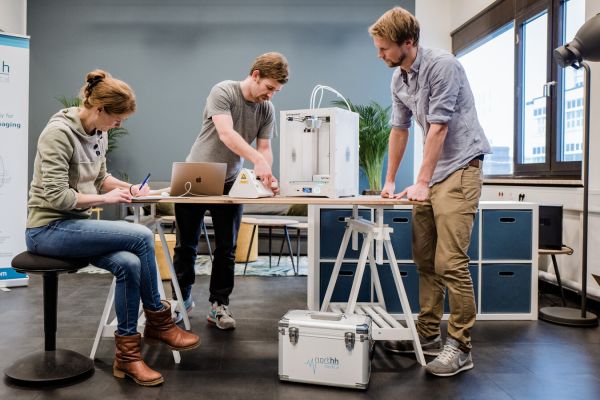Startups are considered particularly innovative because they are flexible and adaptable. Their small size and ability to react quickly to changes and test new, innovative features is beneficial in a constantly changing market. In addition, flat hierarchies and open communication in startups create a dynamic working atmosphere in which ideas can be freely shared and developed. Startups often work at the interface of science, technology and market needs and are thus able to develop innovative industry solutions. The startup culture offers founders an ideal environment to realise their visions and gain valuable experience at the same time. Investors get an opportunity to invest in promising new technologies and business models that could potentially transform entire industries. The ability to scale quickly and tap into niche markets makes startups attractive for collaborations.

Prof. Dr Tim Schweisfurth from Hamburg University of Technology researches how companies can develop innovative solutions in the “Organisational Design and Collaboration Engineering Institute”. We spoke to him about the innovation potential of startups:

Where is innovation heading?
Schweisfurth: Innovation processes are spreading because work procedures are becoming increasingly digital and more and more people are working from home. In the past, comparatively few people i.e., in a company's R&D department. were involved in an innovation process. Ideas were generated and management decided which would be pursued. Thanks to modern IT systems, many more stakeholders are now involved in these creative processes. Far more people evaluate these new ideas.
Which IT tools help generate ideas?
Schweisfurth: If a company wants to generate 10,00 people’s ideas on a specific topic in three hours, it can upload a challenge to a crowdsourcing platform and get a large number of suggestions in no time at all. Crowd voting can also be used to evaluate ideas. These options make the innovation process decentralised and spread out. This has clear advantages in terms of the division of labour. You can easily involve other experts and the ideas become more diverse. However, the more people involved in the process, the less responsibility individuals feel for their suggestions and that is disadvantageous.

What role do startups play in this?
Schweisfurth: Startups are important for new ideas and innovations, as these often emerge on the periphery of systems when you have a new or different perspective on existing things. If a company has been dealing with the same thing for a long time and has already invested in certain solutions, decision-makers are often set in their ways and reluctant to embrace new solutions or change.
You may need e.g., a certain production technology for a new idea, but don't have it, or existing customers are satisfied with your current product, even though an innovation could attract a whole new group of customers.

How can large organisations benefit from working with startups?
Schweisfurth: Large organisations usually need fixed standards to make ideas and development processes manageable. However, this makes organisations sluggish and the enemy of creativity and innovation. For this reason, it is generally easier to experiment and innovate in small companies. As a result, new ideas are more likely to come from people who have not dealt with the problem before and have a fresh perspective. These valuable sources of ideas also include startups, which are simply freer to experiment because of their more agile culture of innovation and the fact that they have invested little in existing applications. University startups have the latest technological knowledge and are free to experiment with these technological innovations by finding new applications.
What hinders startups’ ability to innovate?
Schweisfurth: The growth of startups leads to organisational challenges. At first, only a few people are hired, work flexibly and interaction is rapid. Success leads to more employees and the creation of departments and management levels. Internal communication, which used to be more informal suffers quickly as a result. The challenge for startups and indeed for any company lies in maintaining a healthy balance between differentiation and integration. That also means defining the boundaries of the company and establishing mechanisms for coordinating with the outside world, based on open innovation to obtain external knowledge and observe new trends.
How do startups drive their own innovations and prepare for the future?
Schweisfurth: Startups simply must network as they lack the financial resources to develop and implement everything themselves. You can appoint a person to network at trade fairs and business events. It is also advisable to rely on knowledge and research patent analyses. Research co-operations with universities also open up good opportunities. However, generating knowledge and ideas should not be taken too far. A startup must be able to implement these new ideas and launch them on the market. The best ideas are useless without a product or service. It doesn't help the company and only ties up capacity. Ideally, you should always have both.
Three tips for staying innovative:
1. Encourage internal communication
Establish short internal communication channels and informal opportunities to boost the informal exchange of ideas between employees across departments.
2. Network continuously
Nominate an extrovert who enjoys networking and attends industry and business events regularly.
3. Monitor trends and conduct research
Stay in contact with universities and research departments that are important for your startup both locally and in terms of content.
Which subsidies and technologies do German startups need and why?
Schweisfurth: Unfortunately, investors in Germany provide relatively little venture capital especially for an early-stage startup. I have the impression that entrepreneurial spirit is not highly valued in Germany. Especially if someone has already failed with a company, people tend to be conservative and distrustful instead of recognising the valuable experience of entrepreneurial failure. Innovative startups in particular will need faster financing procedures in future. To achieve this, we also need to make better use of digitalisation and AI. Public funding makes sense, if it is available quickly and easily, e.g., in the form of innovation vouchers for startups, which they can convert into further training, such as coaching.










